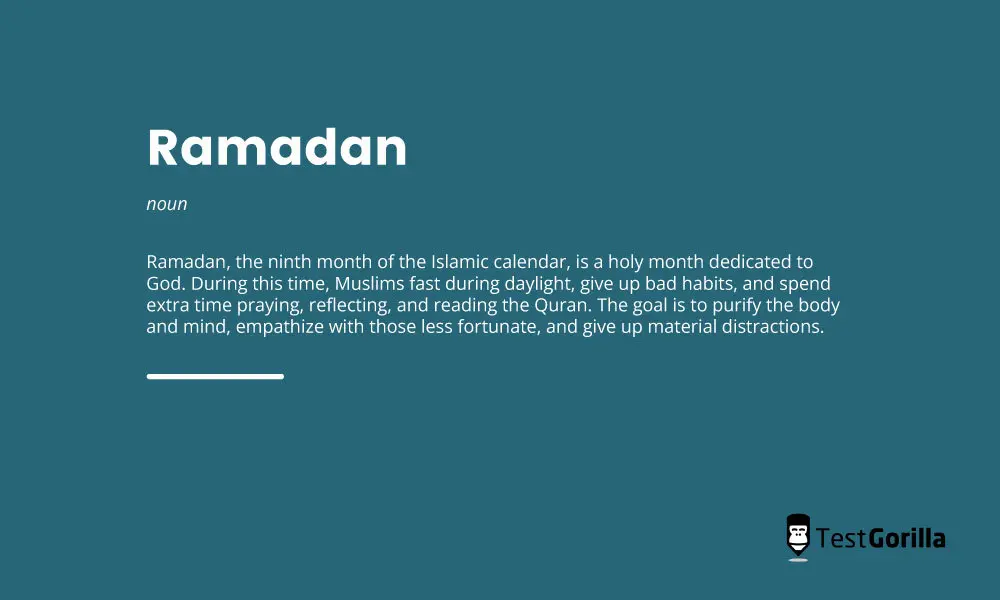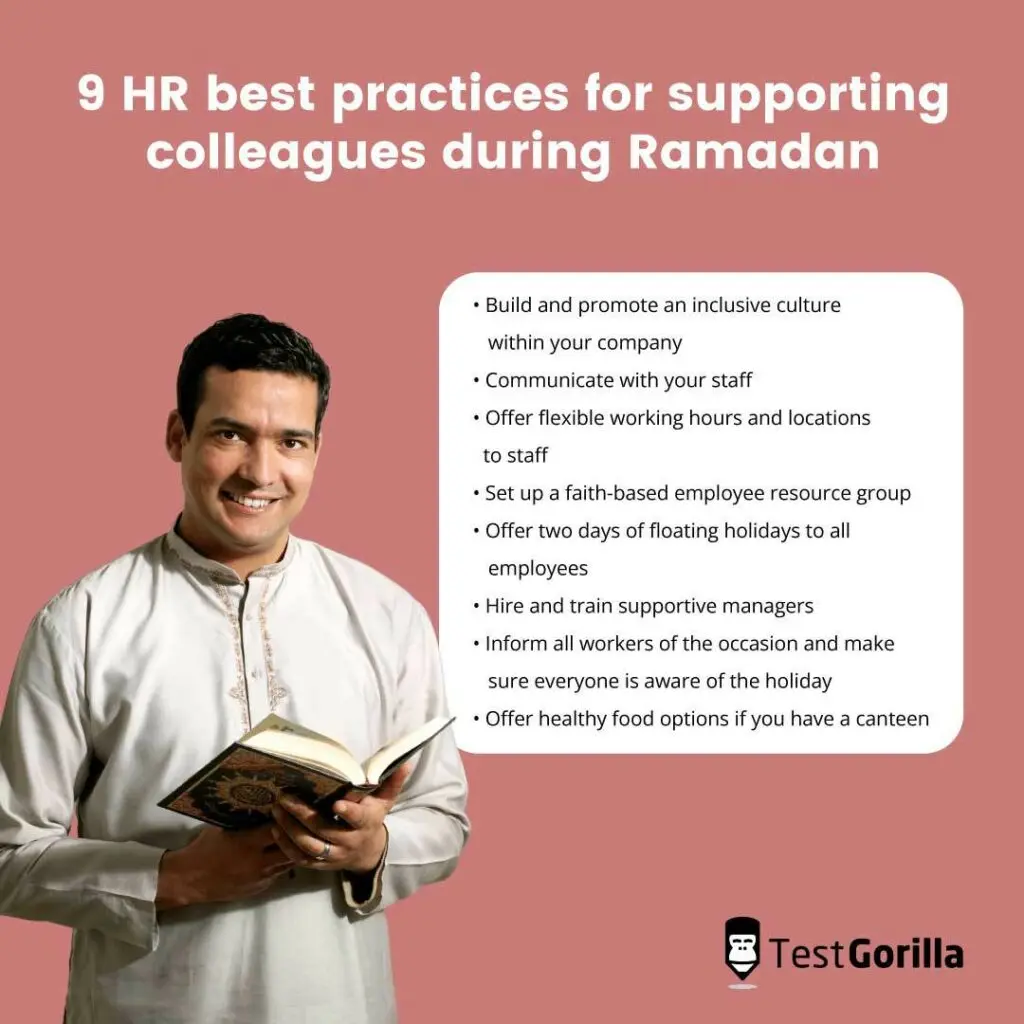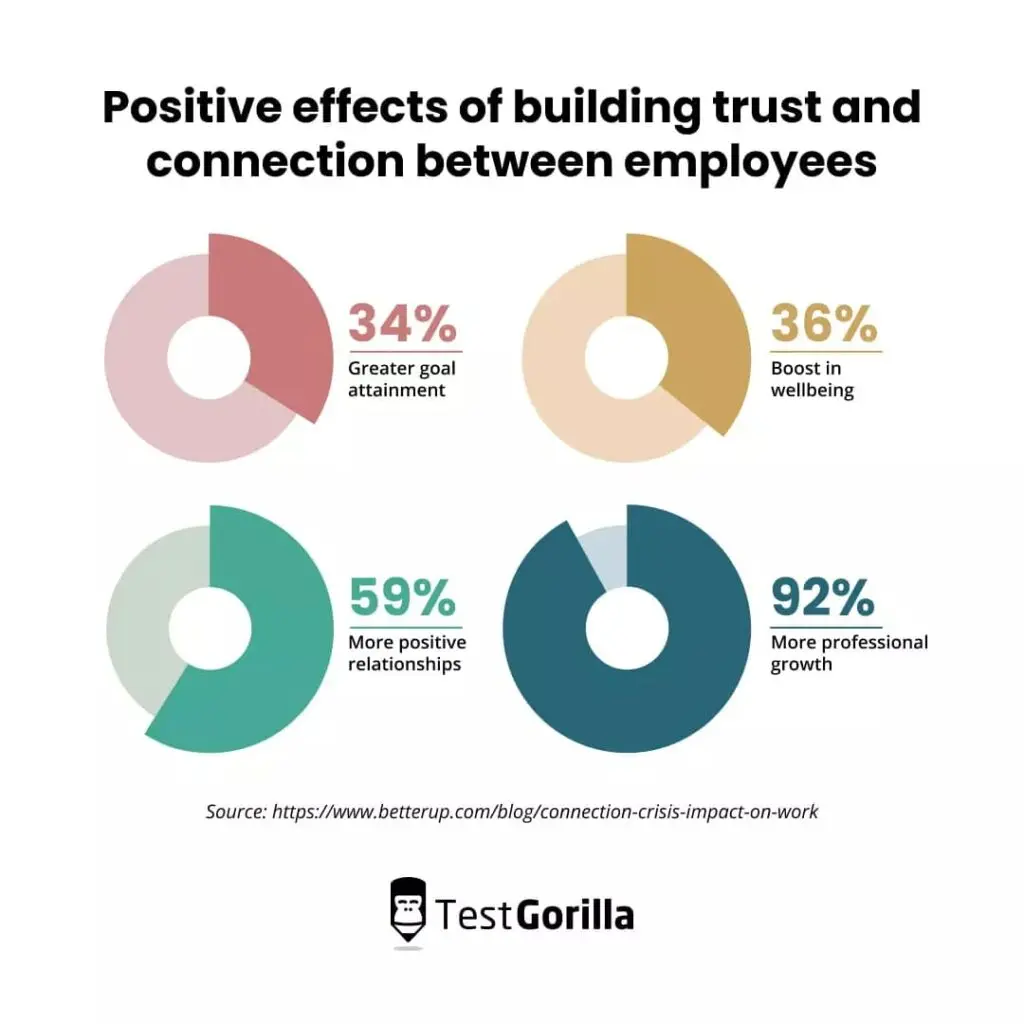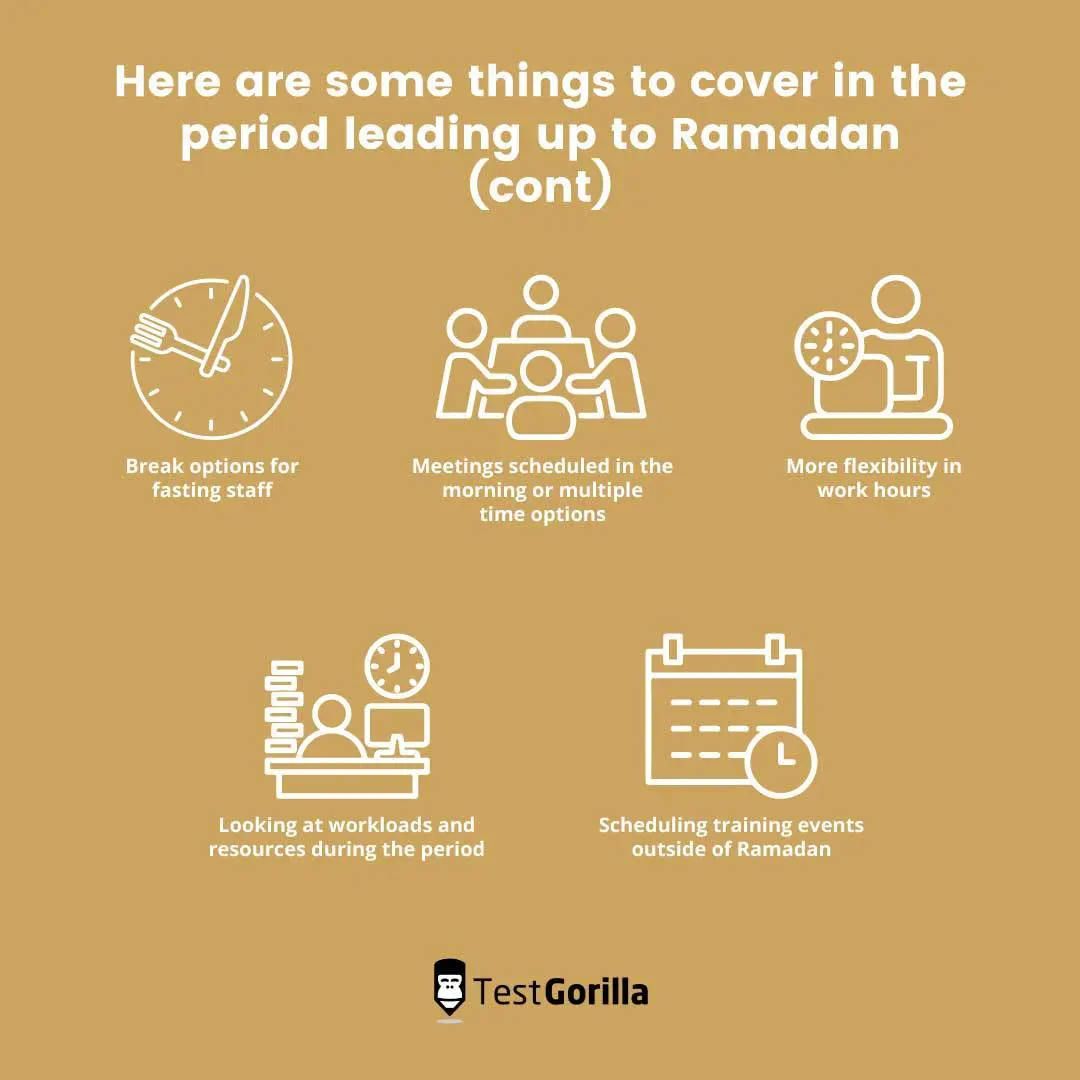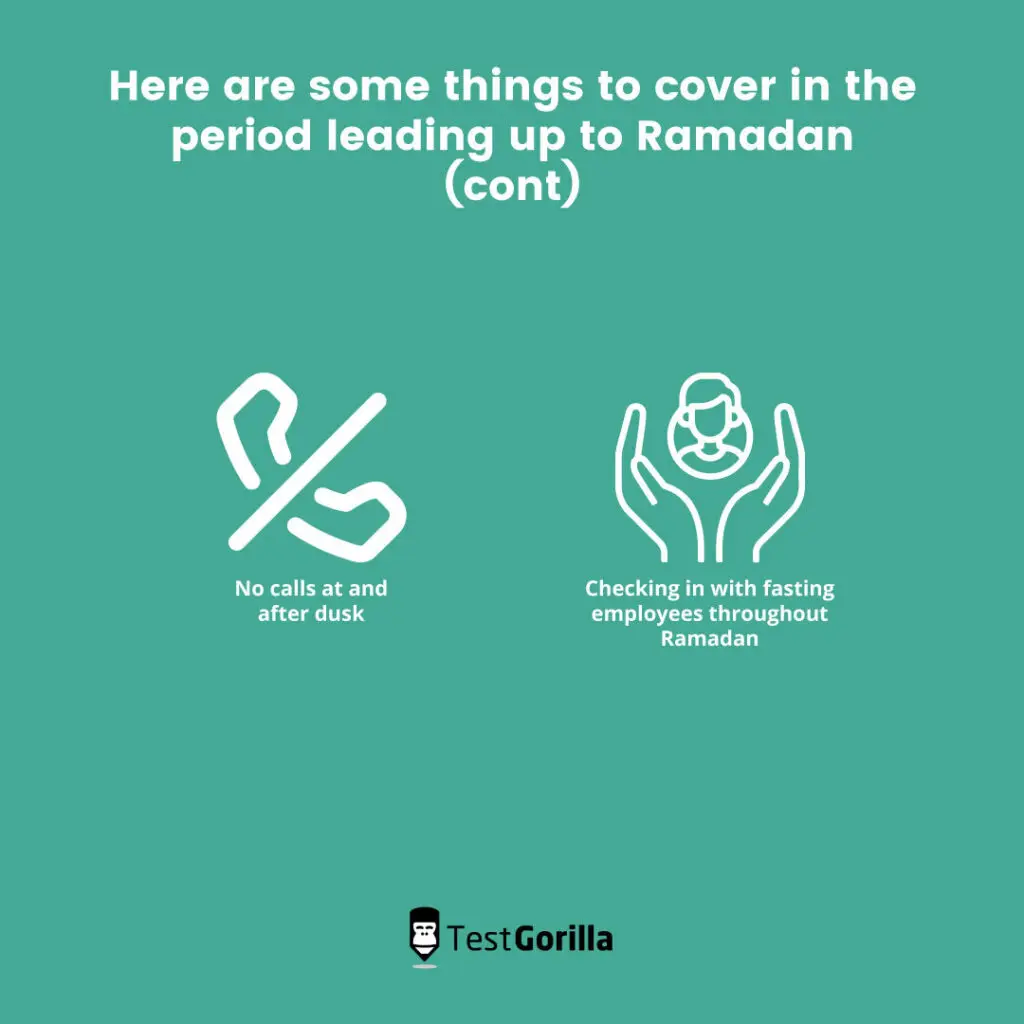With over 1.9 billion Muslims worldwide, you’re bound to have at least a few friends, colleagues, employees, or neighbors fasting during Ramadan each year.[1]
Why and how can you support them at work throughout Ramadan?
Besides being the morally right thing to do, taking every opportunity to make your employees feel included and valued benefits your business.
Workplace belonging leads to a 56% increase in performance, a 50% turnover reduction, and a 75% decrease in employee sick days.[2]
Best of all, the benefits of offering support during the month of Ramadan spill over to all employees – non-Muslims included.
Even those who don’t observe the holiday appreciate the confirmation that their workplace is truly inclusive, leading to a more motivated, engaged, and productive workforce.
Now let’s discuss your approach to accommodating Ramadan in the workplace.
Table of contents
What is Ramadan?
Ramadan, the ninth month of the Islamic calendar, is a holy month dedicated to God. During this time, Muslims fast during daylight, give up bad habits, and spend extra time praying, reflecting, and reading the Quran.
The goal is to purify the body and mind, empathize with those less fortunate, and give up material distractions.
Ramadan is a time of spiritual growth and self-discipline. Fasting during this time, also called sawm, is one of the five pillars of Islam.
The exact date of the holiday moves each year because it follows the lunar calendar.
Ramadan always starts on the new moon and ends 30 days later when Muslims celebrate Eid al-Fitr, one of the most important Islamic holidays, which lasts for one to three days.
During Ramadan, Muslims only eat and drink between sunset and sunrise. This routine can be extremely strenuous, especially for manual laborers or those living near polar regions where daytime can last 18+ hours.
A lot of people continue going to work during this period.
So let’s talk about how all the additional responsibilities and restrictions impact your employees and what they need during their holy month.
If you want to learn more about Ramadan before we continue, we have a FAQ section at the bottom of the post, so feel free to read it first.
How does working during Ramadan impact your Muslim colleagues and employees?
What kind of responsibilities and restrictions take place during Ramadan?
Let’s imagine a normal day during Ramadan. The person wakes up before sunrise to pray and eat, then starts the fast, which lasts until the sun goes down.
In addition to food and drinks, things like cigarettes, chewing gum, and medicine are off the table during the fast.
At sunset, Muslims break the fast and spend time in prayer before they go to sleep.
The start of Ramadan is often the hardest because of withdrawal symptoms from quitting caffeine and drastically changing your routine.
Fasting during daylight hours, performing extra prayers, and having longer nights are challenging enough.
But add work into the mix?
Your fasting colleagues might become sleep deprived during this time
Those who have manually demanding jobs are also at higher risk of dehydration
Some employees might have low energy levels or struggle to focus
The best thing you can do for your employees during this holy period is to understand what they’re going through and offer support where possible.
Don’t hesitate to ask them directly – who better to tell you the precise ways you can help?
We’ve compiled the most useful tactics to get you started.
9 HR best practices for supporting colleagues during Ramadan
The upcoming Ramadan is the perfect opportunity to implement some of these best practices and see how your employees feel.
Summary of the best practices during Ramadan
Use this table as a reminder but read until the end for best results.
Best practices | Key points to remember |
Build and promote an inclusive culture within your company | Send holiday greetings from the company (similar to Christmas and Passover); Add a festive touch to the office; Support zakat and charitable givingImplement other DEI initiatives |
Communicate with your staff | Ask fasting employees what they need; Keep checking in throughout Ramadan |
Offer flexible working hours and locations to staff | Provide hybrid and remote options; Make shift arrangements to avoid afternoon and night shifts; Move the start and end hours, so your employee is home in time to break the fast; Allow flexible hours |
Set up a faith-based employee resource group | Provide all the relevant information; Show new employees you appreciate them from day one; Encourage learning about each other’s cultures; Give employees a space to talk about and practice their religion |
Offer two days of floating holidays to all employees | Let employees pick their days off; Give everyone an equal amount of time off to be fair |
Set up a prayer space for colleagues of all faiths | Provide either a dedicated room or the option to book meeting rooms; Explain the logistics to make the booking process simple |
Hire and train supportive managers | Be consistent on a company level by training managers; Teach them about Ramadan best practices |
Inform all workers of the occasion | Educate employees ahead of time; Avoid awkward moments between colleagues; Encourage employees to support each other |
Offer healthy food options if you have a canteen | Provide meals for shift workers or take-home options; Aim for nutritious foods |
Details and specific ideas ahead.
1. Build and promote an inclusive culture within your company
Diversity means you have employees from various backgrounds. But inclusivity takes things a step further to embrace and celebrate people’s differences and support them in your organization.
You need an inclusive culture to retain your talent. Inclusive teams have higher job satisfaction among their employees.
Celebrating and supporting your Muslim workforce includes acknowledging the significance of Ramadan by:
Sending holiday greetings from the company and top management (similar to Christmas and Passover)
Adding a festive touch to the office
Supporting zakat and charitable giving
But it’s also important to work on inclusivity holistically.
We’re talking about Ramadan specifically, but the accommodations you make for this holiday are more impactful when part of a series of changes you implement in your company to prioritize inclusivity.
Some ideas include:
Flexibility in terms of hours and location (more about this later)
Gender-neutral language in job ads and in general
Benefits like flexible or unlimited paid time off
Hiring panels to avoid personal bias
Monitoring for silos and exclusivity
Equal promotion and learning opportunities for all employees
These best practices help maintain a truly inclusive workforce where diversity doesn’t stop at the door.
2. Communicate with your staff
Don’t assume; ask how your organization can be more supportive.
If you have a mixed, hybrid workforce, your Muslim employees living in various parts of the world might need different accommodations due to different time zones or job descriptions.
If you proactively check in with them about Ramadan, you’re signaling that it’s safe for your employees to express their needs at work honestly.
This is a great way to facilitate trust with employees.
Here are some reasons why trust matters in the workplace:
You can start by making communication an ongoing practice.
Pay attention to how your employees are doing during the course of the holiday, not only at the start.
Ramadan can be demanding.
Sleep deprivation and dehydration symptoms can impair a person’s daily functioning, and they may need frequent breaks as well as some creative ways to meet their needs.
Any attempt at helping them (without pity, of course) shows appreciation to your employees and colleagues and makes them feel welcome in your organization.
3. Offer flexible working hours and locations to staff
Flexibility is one of the most frequently mentioned ways to support colleagues during Ramadan by Muslims who observe it.
Remote and hybrid work settings are major indicators of inclusivity for a reason.
During Ramadan, fasting employees can leverage these policies to pick their ideal window for work, be as productive as they can, and schedule shifts around important moments in their day so they don’t miss out.
You don’t want them to work when they’re distracted or resent work for keeping them from participating in prayers.
Here are some flexible ideas to accommodate your Muslim employees:
Make shift arrangements to avoid afternoon and night shifts
Move the start and end hours, so your employee is home in time to break the fast
If possible, allow them to work whenever they can as long as they meet their due dates
Let employees work from home
4. Set up a faith-based employee resource group
Faith-based resource groups are becoming more popular for a couple of reasons:[3]
They’re accessible for anyone to learn how to support colleagues during the holy month
They contain all the relevant information without burdening your Muslim employees with educating their peers
They show new Muslim employees you appreciate them and their culture from day one
They encourage employees to learn about each other’s cultures and improve their understanding of colleagues
They give employees a space to talk about and practice their religious beliefs with others
These benefits extend to the entire company, not only the group or holiday in question.
5. Offer two days of floating holidays to all employees
Floating holidays are a great addition to your regular PTO policy and other non-traditional benefits because they give employees control over when they are away from work.
The start of Ramadan moves each year, so this also accounts for the change.
Floating days are particularly helpful during the last day of Ramadan, Eid, when many Muslims take time off to celebrate with their communities.
To be fair, offer all employees two days they can take during religious holidays or important personal days like birthdays or anniversaries.
6. Set up a prayer space for colleagues of all faiths
You can provide a dedicated prayer space or allow employees to book meeting rooms for this purpose.
To make this work in practice, plan the logistics.
What’s the procedure for booking a room?
Is there a way to check the availability of meeting rooms for the following weeks? Is there a program or person who needs to approve the time?
Make this process as straightforward as possible.
That way, you avoid double-booking meeting rooms or stressing out your employees when they need to focus on prayers or work.
7. Hire and train supportive managers
Managers are people.
They each have their own understanding of other cultures and practices that may or may not line up with your expectations. The thing is, you can’t leave inclusivity up to chance.
Any effort you make must be consistent across your company, independent of the manager.
Your managers need to push your ethos and help you facilitate an inclusive culture, so make sure they know how (and are willing) to support fasting staff.
Here are some things to cover in the period leading up to Ramadan:
Break options for fasting staff
Meetings scheduled in the morning or multiple time options
More flexibility in work hours
Looking at workloads and resources during the period
Scheduling training events outside of Ramadan
No calls at and after dusk
Checking in with fasting employees throughout Ramadan
By training managers, you enable them to make the right calls in the context of their teams and colleagues and any problems that come up.
This increases your chances of any DEI initiative succeeding.
For example, a broad “meetings in the morning only” rule is hard to make remote-friendly because of time zone differences.
However, managers can always communicate with employees and provide several time options if everybody needs to attend.
Without supportive managers, all policies start and stop at documentation.
8. Inform all workers of the occasion and make sure everyone is aware of the holiday
Spread the word about Ramadan before it starts.
Explain what it entails, so all employees can understand what this period means for their colleagues and do their part to support them.
This also helps to avoid awkward events like team members organizing a lunch meeting during this period or calling a coworker during prayer time.
9. Offer healthy food options if you have a canteen
Either offer meals to shift workers or help fasting colleagues prepare their meals during this period by offering take-home options.
Both options are a huge hand when picking options for breaking their fasts.
Good foods to include are fresh fruits, vegetables, loaves of bread, Halal meats, cheese, and sweets.
In general, aim for foods full of complex carbs, protein, and fiber.
Offering healthy food shows you’re thinking about your employees’ well-being, and they don’t have to wait until they’re home to break the fast.
After a whole day without food, minutes can make a huge difference.
FAQs about Ramadan in the workplace
If you’re unfamiliar with the context surrounding Ramadan, it’s great you’re looking to learn more – and you’re in the right place.
We cover some common questions and concerns below.
Can you work during Ramadan?
Yes.
Provided the right accommodation and support in the workplace, employees who fast can do their regular responsibilities at work.
We’ve covered the best practices to help during Ramadan at work.
To sum them up quickly, they mostly revolve around being understanding, providing flexible work options, and ensuring all employees fully grasp the initiative.
What are the benefits of supporting Muslim colleagues during Ramadan?
Apart from simply being the kind thing to do, supporting employees of different cultures directly benefits their health and performance, benefitting your business by extension.
This applies to supporting your Muslim colleagues during Ramadan.
What benefits are we talking about exactly?
Benefit | Explanation |
Retention | Muslims are twice as likely to stay with an employer who supports them during Ramadan for five years or more[4] |
Inclusivity and diversity | DEI in practice makes the workplace a more welcoming place where everyone feels a sense of belonging and trust |
Employee satisfaction | Supporting employees during important and trying times shows you appreciate them and makes them happier at work |
In the end, Ramadan is only one month of the year.
Even if your workers’ productivity takes a dip during this time, supporting them will help motivate, engage, and retain them in the long run.
When is Ramadan?
The date changes each year to follow the lunar calendar. Save the dates for the years to come:
2023: Thursday, March 23
2024: Monday, March 11
2025: Saturday, March 1
2026: Wednesday, February 18
2027: Monday, February 8
Do all Muslims observe Ramadan?
Pretty much every Muslim observes Ramadan, which means you likely have a friend, colleague, or neighbor who does.
Those who don’t fast every day can make up for the time they skipped by fasting at another time during the year or feeding the poor.
Of course, there are exceptions in cases when fasting isn’t possible or recommendable.
Pregnant women, children, the elderly, travelers, or those living with a disease or in extreme conditions are all exempt from fasting during Ramadan.
How should you greet colleagues during Ramadan?
The two best common greetings are:
“Ramadan Mubarak,” roughly translated to “happy Ramadan”
“Ramadan Kareem,” roughly translated to “have a generous Ramadan”
On the last day of Ramadan, Eid al-Fitr, the greeting changes to “Eid Mubarak” or “Eid Saeed” (have a happy festival).
Should you encourage gift-giving during Ramadan?
Yes, charitable giving is appropriate during Ramadan.
Muslims themselves do this throughout the holy month. They’re required to give zakat, a portion of their income or food (typically grains) donated to the poor.
You can also give your Muslim colleagues gifts at the end of Ramadan, as this is a time for celebration, kindness, and connection.
Celebrating Ramadan at work is all pros and zero cons
DEI initiatives only work when they’re embedded into the company culture and consistent across the board, so nobody gets left behind.
It can’t be a single policy or isolated event but rather a series of gestures to include, welcome, and celebrate employees of all backgrounds.
Celebrating Ramadan at work is one such gesture.
Your Muslim employees are supported and comfortable, and other employees get to see everyone is safe and accepted for who they are in the workplace.
Keep learning about the importance and benefits of DEI and ways to attract diverse talent.
And the next time you hire, use a Culture Add test to help with diversity, innovation, and inclusion.
Sources
“Muslim Population by State 2023”. (2023). World Population Review. Retrieved February 10, 2023. https://worldpopulationreview.com/state-rankings/muslim-population-by-state
“The Value of Belonging at Work: New Frontiers for Inclusion in 2021 and Beyond”. (2021). BetterUp. Retrieved February 10, 2023. https://grow.betterup.com/resources/the-value-of-belonging-at-work-the-business-case-for-investing-in-workplace-inclusion
Peel, Bill. (December 5, 2020). “Faith-based Employee Resource Groups on the Rise”. Center for Faith & Work St. Louis. Retrieved February 10, 2023. https://www.faithandworkstl.org/blog/faith-based-employee-resource-groups-on-the-rise
Husain, Ammar. (March 29, 2021). “Ramadan at Work”. Muslim Census. Retrieved February 10, 2023. https://muslimcensus.co.uk/ramadan-at-work/
Related posts
Hire the best candidates with TestGorilla
Create pre-employment assessments in minutes to screen candidates, save time, and hire the best talent.
Latest posts
The best advice in pre-employment testing, in your inbox.
No spam. Unsubscribe at any time.

Hire the best. No bias. No stress.
Our screening tests identify the best candidates and make your hiring decisions faster, easier, and bias-free.
Free resources
This checklist covers key features you should look for when choosing a skills testing platform
This resource will help you develop an onboarding checklist for new hires.
How to assess your candidates' attention to detail.
Learn how to get human resources certified through HRCI or SHRM.
Learn how you can improve the level of talent at your company.
Learn how CapitalT reduced hiring bias with online skills assessments.
Learn how to make the resume process more efficient and more effective.
Improve your hiring strategy with these 7 critical recruitment metrics.
Learn how Sukhi decreased time spent reviewing resumes by 83%!
Hire more efficiently with these hacks that 99% of recruiters aren't using.
Make a business case for diversity and inclusion initiatives with this data.

